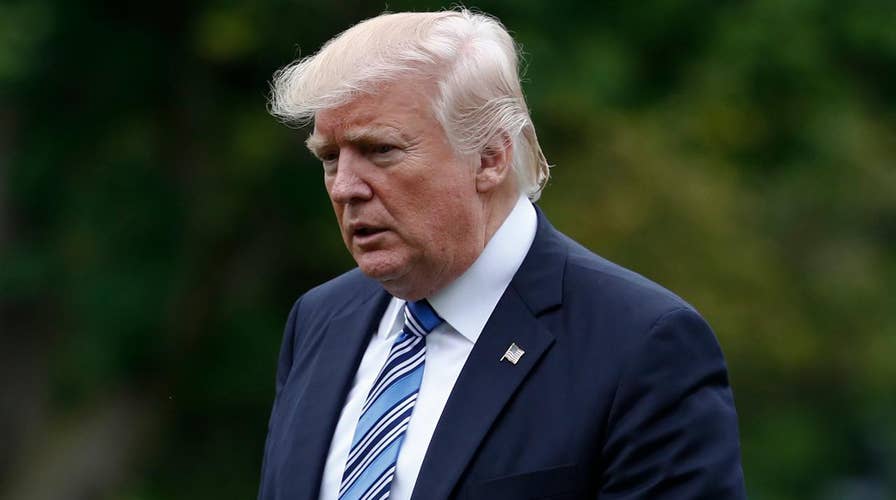Trump to visit Israel during first overseas trip
Times of Israel founder David Horovitz provides insight
President Trump is heading overseas for a remarkably ambitious diplomatic mission covering everything from Middle East peace to the fight against ISIS, in what could offer the White House a chance at a reset from waves of negative media coverage driven by the firing of FBI Director James Comey.
“We’re looking forward to a trip around the world,” Press Secretary Sean Spicer said, amid yet another round of grilling by the White House press corps.
Spicer and other top White House officials have emphasized the need to put a stop to the leaks that have fueled the recent controversies, including a report that Trump revealed sensitive intelligence to the Russians and another that he once told Comey he “hoped” the FBI would back off the investigation into former national security adviser Michael Flynn. The White House disputes both accounts, and has tried to focus attention on the upcoming trip, Trump’s first overseas foray as president.
“I do think there's an opportunity here, but Team Trump really needs some self-discipline if the president is to collect on what is a very real opportunity to improve things in the Middle East” and elsewhere, Harvard historian Niall Ferguson told Fox News.
The president’s agenda is, to say the least, ambitious. While most presidents start their first terms with visits to nearby Mexico and Canada, Trump is taking on some of the most intractable issues on the planet, right out of the gate.
The trip begins Friday with a stop in Saudi Arabia, followed by planned visits to Israel and the Vatican. Trump will later attend a NATO summit in Brussels, Belgium, and a G7 summit in Taormina, Italy.
Jim Townsend, the senior Pentagon official for Europe and NATO under President Barack Obama and a senior fellow with the left-leaning Center for a New American Security, suggested Trump could find some sympathy abroad. And he rejected suggestions that allies couldn’t trust the administration after the report that he shared Israel-obtained intelligence on ISIS with the Russian foreign minister.
“The allies themselves are politicians who know what it’s like to be hammered at home,” Townsend told Fox News. “There is some respect for the warrior, and there is some sympathy because he’s getting beat up, but most of all they have a lot of respect for his national security team and for what we can do as a government.”
Nile Gardiner, of the right-leaning Heritage Foundation, also doesn’t think the media scrutiny will impact Trump diplomacy. “Our allies are going to work with the president regardless of domestic upheaval because it’s in their strategic interest,” he said.
Indeed, the Israelis have downplayed the impact of the discussion of intelligence with the Russian foreign minister. “If Obama didn’t succeed in intentionally destroying the U.S.-Israeli security relationship, Trump’s not going to do it accidentally,” said a veteran Middle East analyst briefed on the president’s trip. “The Israelis know that these leak stories are a media campaign aimed at undermining the historical visit and Trump’s broader efforts to restore the U.S.-Israeli alliance.”
Gardiner, a former adviser to the late British Prime Minister Margaret Thatcher, argued that Trump’s trip could reflect a dynamic that’s the opposite of what transpired the last eight years. “When President Obama was in office things were relatively calm domestically compared to now, but his overseas visits were often strategic failures, lacking in leadership, often aimless and directionless,” he said.
When Trump arrives in Saudi Arabia on Friday, he is expected to outline his vision for a new “Arab NATO” to fight terrorism and contain Iran. He also will announce one of the largest arms deals in history, as he prepares to next prod Israeli and Palestinian leaders back to the table for peace talks.
Townsend is skeptical about the prospects for a pan-Arab military alliance. “NATO is really unique because of Europe’s shared history and desire to avoid another conflict like World War II,” he said. “These nations in the Middle East don’t share that kind of history. There’s a lot of reasons why an ‘Arab NATO’ would fracture.”
Gardiner said the bar is set higher for Trump compared to his predecessor. “When President Obama started off on an apology tour around the world, much of the press didn’t bat an eyelid and it was quite humiliating for a president to do that. President Trump knows that he’s going to attract a lot more criticism. I think a big chunk of the media will be looking for the president to fail,” he said.
Townsend said there is still plenty of room for positives, especially as the trip moves on into Europe next week, with visits to Brussels, the Vatican and Sicily for the G7 meeting, not least because Trump already knows many of the leaders he’ll be meeting with. “He’s going to see people he should feel comfortable with. The trip itself is going to be full of important symbolism, for his base if you’re Catholic … and Europe itself just had a populist uprising,” he said.
Gardiner said the “best way for Trump to respond to his critics is to make clear in Brussels that he stands with his NATO allies against any Russian aggression and calls for Moscow to back off on Ukraine.”
Just as importantly, Townsend said, the rigid structure of a whirlwind tour through multiple countries, micromanaged by large staffs trying to keep up with busy schedules, cannot be underestimated when it comes to White House hopes to avoid gaffes and forge a reset.
“Trump will be managed during those trips unlike in the White House where he loves to tweet,” said Townsend. “You are really scripted and it’s hard to get off that script. This will probably lessen the potential for something going on. Given all that’s happened in the last 48 hours, some heat will inevitably come off.”
Fox News’ Ben Evansky contributed to this report.













































